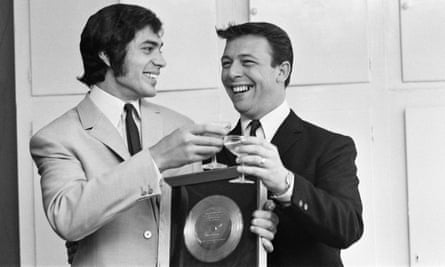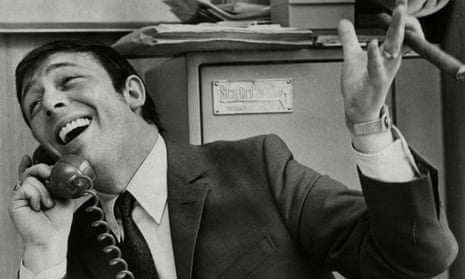In the 1960s, the pianist, songwriter and arranger Les Reed was given a simple dictum by the music manager Gordon Mills: “Romantic songs for Engelbert Humperdinck, sexy ones for Tom Jones.” With the lyricist Barry Mason, Reed wrote The Last Waltz (1967) and Winter World of Love (1969) for Humperdinck and I’m Coming Home (1966) and Delilah (1968) for Jones.
“I was so knocked out with what Barry did with Delilah,” said Reed in 2003, “and he in turn went ballistic when I played him the intro, which was a minor ninth chord in waltz tempo. When he got to the chorus I was still in A minor and he said, ‘It needs to be in a different key and it needs to be uplifting.’ I went to the relative major in C and a hit was born.”
Reed, who has died aged 83, also wrote the arrangement for another of Jones’s biggest hits, Green, Green Grass of Home (1967). “I got to know what Tom liked,” said Reed. “He loved good lyrics and he liked melodies with a little blues touch and once you’ve got that, you’re home.”
Reed was born in Westfield, on the outskirts of Woking, Surrey. His father, Ralph, arranged for him to have piano lessons from an early age. Although Ralph was away fighting in the second world war as Les grew up, he would write home, giving encouragement and setting objectives.
The trauma of wartime inspired one of Reed’s biggest musical successes. “My mother, Beatrice, and her sisters went to a dance every Friday at the YWCA, which was women only, as the men were away. It was very near our home and when I heard the last waltz at 9.30, I knew I’d be getting my supper in 10 minutes. When I told this years later to Barry Mason, he said, ‘Let’s write The Last Waltz.’”
When Ralph returned home, he formed a semi-professional variety act, the Westfield Kids, in which Les played the accordion. At 15, Les formed the Willis Reed Group with a friend, Peter Willis. He passed the entrance examinations for the London College of Music but was conscripted for national service, during which he played the clarinet and wrote arrangements for the Royal East Kent Military Band.

He was demobbed in 1956 and two years later played a summer season at Butlins in Clacton-on-Sea, Essex, with the guitarist Vic Flick. When Flick joined the John Barry Seven, he recommended his friend to Barry and soon Reed was playing the piano on the BBC TV series for teenagers, Drumbeat. “That’s when I discovered rock’n’roll,” said Reed, “I was confused and frustrated at first, as I couldn’t put in flattened fifths, but I quickly realised what passion there is in rock music. I knew I had to get simple and that’s been a good rule – take notice of what the man in the street wants, don’t indulge yourself.”
Reed was involved in Barry’s hit records Walk – Don’t Run and Hit and Miss, and he was the second pianist on Russ Conway’s Pepe (1961). The John Barry Seven recorded and toured with the pop star Adam Faith, who was best man at Reed’s wedding to June Williams in 1960.
In 1962, Reed left Barry and joined Piccadilly Records, a new subsidiary of Pye. He arranged hit records for Joe Brown and Emile Ford and almost had a hit himself in 1963 by rocking up Mozart in Minuet Mash by the Les Reed Combo. His first successful composition was the chirpy Tell Me When, written with Geoff Stephens for the beat group the Applejacks, on Decca in 1964.
Mills, a singer and songwriter in the musical trio the Viscounts, had then recently signed Tom Jones to a management contract, having heard him sing in a working-men’s club in Wales. He asked Reed to complete and arrange a song he had begun writing, It’s Not Unusual. It became Jones’s first No 1, in 1965, and has since been recorded by artists including Cher, Garth Brooks, Vic Damone, Marvin Gaye and Robbie Williams.
Reed arranged You’ve Got Your Troubles for the Fortunes, a No 2 in 1965, and wrote his first hit with Mason with the follow-up, Here It Comes Again. He added polish to arrangements for the Dave Clark Five, and with Mason wrote Everybody Knows, a No 2 hit for them in 1967.
Reed got the idea for another hit when he was talking to a friend, Tony Phillips, about how his (not very busy) acting career was going. Phillips told him, “There’s a kind of hush all over the world.” “Can I use that?” asked Reed and Phillips replied, “Be my guest.” There’s a Kind of Hush was a hit for Herman’s Hermits in 1967 and an international success for the Carpenters in 1976.
Reed could simply have lived off the royalties from The Last Waltz, a No 1 for Humperdinck, but he was passionate about music. He enjoyed conducting a Beatles medley for the London Philharmonic Orchestra in 1967 so much that he undertook many further orchestral concerts. He conducted for international song festivals and wrote several songs for these events, notably Love Is All, sung by Malcolm Roberts at the 1969 Rio de Janeiro song festival. He hosted a TV series, The International Pop Proms, for Granada in 1976.
Reed had a share in Wessex Studios in Highbury, north London. Des O’Connor, recording an advertisement there, suggested to Reed, “Why don’t you write me a song?” By the time O’Connor had finished the commercial, Reed and Mason were ready with I Pretend, a No 1 in 1968.
In 1970, Reed started his own label, Chapter One, which released Sally by Gerry Monroe, a top 10 hit that year, and his own album, The New World of Les Reed, in 1973, which featured classics with a Latin beat. Later that year, the Les Reed Orchestra released Lest We Forget, written for Armistice Day, with royalties donated to charity.
Reed’s songs were adopted by sports teams around the world. “Several American football teams sing our songs,” he said. “The New York Yankees have It’s Not Unusual.” His song Leeds! Leeds! Leeds!, the B-side of Leeds United’s 1972 FA Cup single, is still sung on the terraces as Marching On Together, and Stoke City have adopted Delilah.
Reed wrote the soundtrack for the Marianne Faithfull film The Girl on a Motorcycle (1968), which featured Reed’s Hammond organ alongside lush strings and ambient noises. His attempts to realise his dream – of writing a stage musical as good as West Side Story, with one big song following another – included Beautiful and Damned, written with Roger Cook, about Zelda Fitzgerald, which had a West End run at the Lyric theatre in 2004.
He was appointed OBE in 1998.
June died in 2011. Reed is survived by his daughter, Donna, and two grandsons, Alex and Dom. He wrote Donna’s Theme, recorded in 1961 by the John Barry Seven, for his daughter, who was later to manage his music publishing.

Comments (…)
Sign in or create your Guardian account to join the discussion